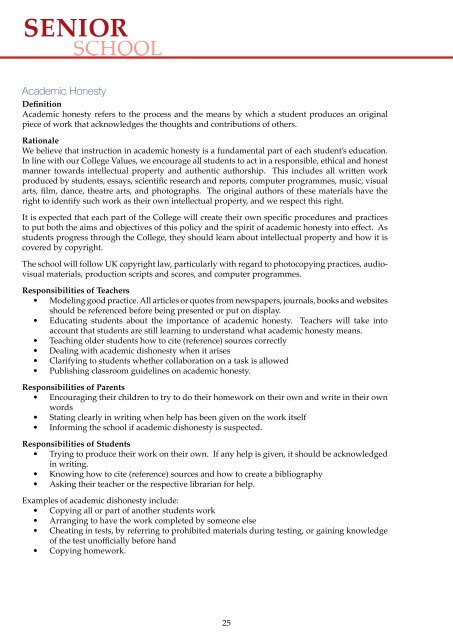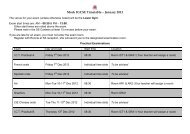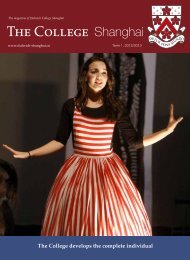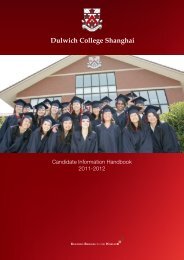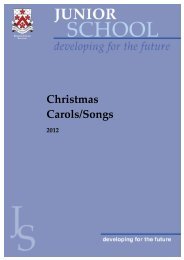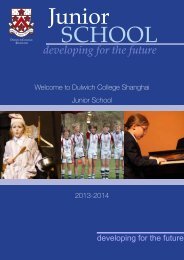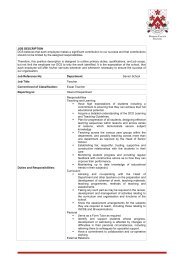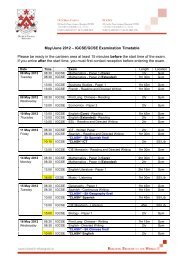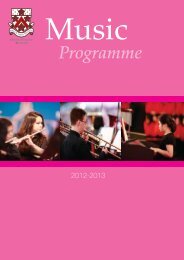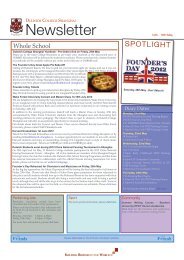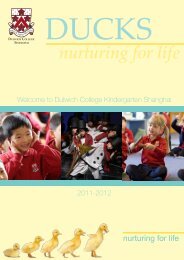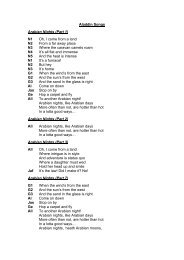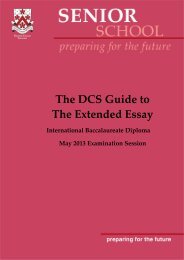Download the Senior School Welcome Booklet here - Dulwich ...
Download the Senior School Welcome Booklet here - Dulwich ...
Download the Senior School Welcome Booklet here - Dulwich ...
Create successful ePaper yourself
Turn your PDF publications into a flip-book with our unique Google optimized e-Paper software.
Academic Honesty<br />
Definition<br />
Academic honesty refers to <strong>the</strong> process and <strong>the</strong> means by which a student produces an original<br />
piece of work that acknowledges <strong>the</strong> thoughts and contributions of o<strong>the</strong>rs.<br />
Rationale<br />
We believe that instruction in academic honesty is a fundamental part of each student’s education.<br />
In line with our College Values, we encourage all students to act in a responsible, ethical and honest<br />
manner towards intellectual property and au<strong>the</strong>ntic authorship. This includes all written work<br />
produced by students, essays, scientific research and reports, computer programmes, music, visual<br />
arts, film, dance, <strong>the</strong>atre arts, and photographs. The original authors of <strong>the</strong>se materials have <strong>the</strong><br />
right to identify such work as <strong>the</strong>ir own intellectual property, and we respect this right.<br />
It is expected that each part of <strong>the</strong> College will create <strong>the</strong>ir own specific procedures and practices<br />
to put both <strong>the</strong> aims and objectives of this policy and <strong>the</strong> spirit of academic honesty into effect. As<br />
students progress through <strong>the</strong> College, <strong>the</strong>y should learn about intellectual property and how it is<br />
covered by copyright.<br />
The school will follow UK copyright law, particularly with regard to photocopying practices, audiovisual<br />
materials, production scripts and scores, and computer programmes.<br />
Responsibilities of Teachers<br />
• Modeling good practice. All articles or quotes from newspapers, journals, books and websites<br />
should be referenced before being presented or put on display.<br />
• Educating students about <strong>the</strong> importance of academic honesty. Teachers will take into<br />
account that students are still learning to understand what academic honesty means.<br />
• Teaching older students how to cite (reference) sources correctly<br />
• Dealing with academic dishonesty when it arises<br />
• Clarifying to students whe<strong>the</strong>r collaboration on a task is allowed<br />
• Publishing classroom guidelines on academic honesty.<br />
Responsibilities of Parents<br />
• Encouraging <strong>the</strong>ir children to try to do <strong>the</strong>ir homework on <strong>the</strong>ir own and write in <strong>the</strong>ir own<br />
words<br />
• Stating clearly in writing when help has been given on <strong>the</strong> work itself<br />
• Informing <strong>the</strong> school if academic dishonesty is suspected.<br />
Responsibilities of Students<br />
• Trying to produce <strong>the</strong>ir work on <strong>the</strong>ir own. If any help is given, it should be acknowledged<br />
in writing.<br />
• Knowing how to cite (reference) sources and how to create a bibliography<br />
• Asking <strong>the</strong>ir teacher or <strong>the</strong> respective librarian for help.<br />
Examples of academic dishonesty include:<br />
• Copying all or part of ano<strong>the</strong>r students work<br />
• Arranging to have <strong>the</strong> work completed by someone else<br />
• Cheating in tests, by referring to prohibited materials during testing, or gaining knowledge<br />
of <strong>the</strong> test unofficially before hand<br />
• Copying homework.<br />
25


